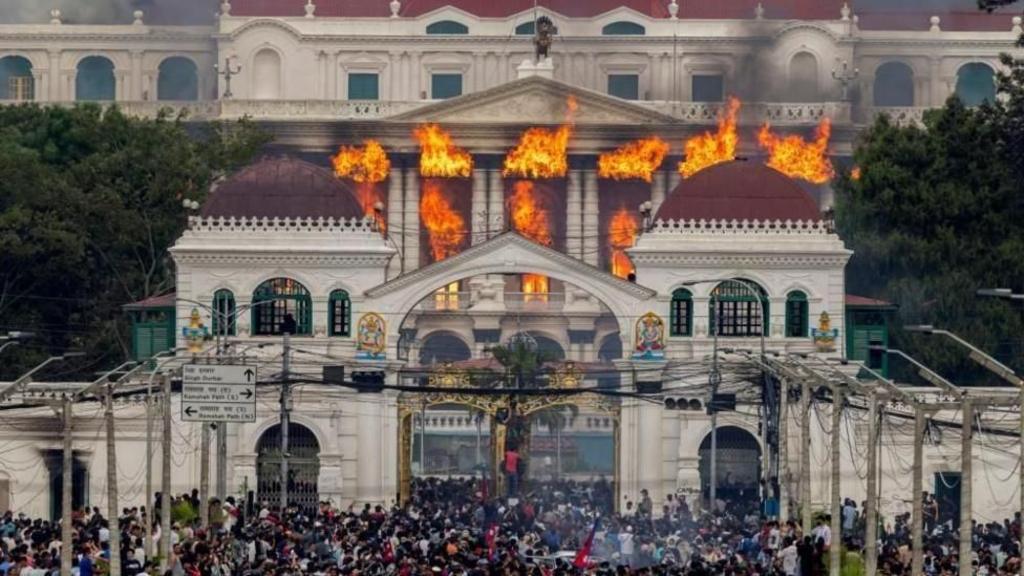“`html
Leading political factions in Nepal are calling for President Ram Chandra Poudel to reinstate the parliament, which he dissolved in the wake of recent anti-corruption demonstrations that resulted in fatalities.
In a joint statement, eight political parties, including the Nepali Congress, CPN-UML, and Maoist Centre, have asserted that President Poudel’s actions were unconstitutional.
President Poudel dissolved the House of Representatives on Friday, acting upon the recommendation of newly appointed interim Prime Minister Sushila Karki, a move that also aligned with a primary demand of the protest movement.
The dissolution followed widespread protests this week against a ban on social media platforms, during which over 50 individuals lost their lives in clashes with law enforcement. Sushila Karki’s appointment as interim Prime Minister came after reaching an agreement with protest leaders.
Although the social media ban was rescinded on Monday, the protests had already escalated into a significant mass movement. On Tuesday, demonstrators in Kathmandu reportedly set fire to parliament and government buildings, leading to the resignation of then-Prime Minister KP Sharma Oli.
The statement issued on Saturday, which demands the restoration of parliament, was endorsed by the chief whips of the eight aforementioned political parties.
The parties contend that the president’s decision was unconstitutional and deviates from established precedents within Nepal’s judicial system.
Notably, the dissolution of parliament was a key request put forth by student leaders involved in the “Gen Z” protest movement.
However, the eight political parties argue that the demands of the protesters, which include the call for new elections scheduled for March 5th of the upcoming year, should be addressed through an institution elected by the populace.
In a subsequent statement on Saturday, President Poudel urged all parties to exercise restraint and cooperate in facilitating the upcoming elections.
He conveyed that a peaceful resolution was being pursued amidst a “very… difficult and scary situation.”
“The constitution is alive, the parliamentary system is alive and the federal democratic republic still exists. People have an opportunity to move forward in the path of a more efficient democracy by conducting elections within six months,” the president affirmed.
Sushila Karki, a 73-year-old former Chief Justice of the Supreme Court and the first woman to hold the position of Prime Minister in Nepal, was officially sworn in during a concise ceremony in Kathmandu.
She is anticipated to appoint ministers to her cabinet in the coming days.
Karki is generally perceived as having a clean reputation, and her leadership of the interim government has garnered support from student leaders within the “Gen Z” movement.
Her cabinet will be confronted with numerous challenges, including restoring law and order, reconstructing the parliament and other key buildings that were damaged, addressing the concerns of the Gen Z protesters who seek change, and reassuring those in Nepal who fear that the country’s young democracy and constitutional order may be undermined.
Another critical task will be to hold those responsible for the violence accountable.
Nepal is progressively returning to a state of normalcy following the recent period of unrest.
Nepali soldiers, who had been deployed to patrol the streets of Kathmandu, have returned to their respective bases following Karki’s inauguration.
The protests were initially sparked by the government’s decision last week to ban 26 social media platforms, including WhatsApp, Instagram, and Facebook. However, they soon evolved to represent a broader dissatisfaction with Nepal’s political establishment.
In the weeks preceding the ban, a “nepo kid” campaign, which highlighted the affluent lifestyles of politicians’ children and allegations of corruption, gained traction on social media.
While the social media ban was promptly lifted on Monday night, the protests had already gained irreversible momentum.
“`

